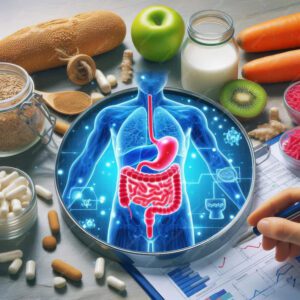How to Reduce Your Risk of Colon Cancer: Diet and Lifestyle Tips
Colon cancer is one of the most common types of cancer, but the good news is that it’s also one of the most preventable. By making a few changes to your diet and lifestyle, you can significantly reduce your risk of developing colon cancer.
In this blog, we’ll explore how your everyday habits play a big role in protecting your colon health and what specific actions you can take to minimize the risk.


Why Colon Cancer Prevention Matters
Colon cancer doesn’t develop overnight—it’s a slow-growing disease that often starts as small, noncancerous polyps in the colon. While some risk factors, like age and genetics, are out of our control, many others are lifestyle-related. By focusing on prevention through diet, exercise, and regular screening, you can make a significant impact on your long-term health.1. Eat More Fiber-Rich Foods
Fiber is your colon’s best friend. High-fiber foods help keep your digestive system running smoothly and can prevent constipation. But more than that, studies have shown that people who eat a fiber-rich diet have a lower risk of developing colon cancer. Fiber helps move waste through your intestines more quickly, reducing the time that potential carcinogens come into contact with your colon lining.
Foods to include:
- Whole grains (brown rice, oats, whole wheat)
- Beans and legumes (lentils, chickpeas, black beans)
- Vegetables (broccoli, carrots, spinach)
- Fruits (apples, pears, berries)
2. Limit Red and Processed Meats
There’s solid evidence linking red and processed meats to an increased risk of colon cancer. Processed meats like bacon, sausage, and deli meats contain nitrates and other chemicals that can damage cells in the colon. High consumption of red meat (beef, pork, lamb) is also associated with a higher cancer risk, possibly due to its iron content or how it's cooked. Try to limit your intake of these meats and focus on leaner protein sources like chicken, fish, and plant-based options.Consider these swaps:
- Replace bacon with turkey bacon or veggie alternatives.
- Swap red meat for grilled fish or tofu in your meals.
3. Maintain a Healthy Weight
Obesity is a major risk factor for colon cancer. Studies suggest that people who are overweight or obese are more likely to develop colon cancer than those who maintain a healthy weight. Excess fat, especially around the abdomen, can increase inflammation in the body, which in turn can contribute to cancer development. Regular exercise and a balanced diet can help you maintain a healthy weight and lower your risk.Small changes to try:
- Go for a 30-minute walk after meals.
- Incorporate more fruits and vegetables into your snacks.
4. Get Moving: Regular Exercise
Physical activity doesn’t just help with weight management—it also helps to reduce colon cancer risk by speeding up digestion, which can decrease the amount of time harmful substances spend in the colon. Aim for at least 30 minutes of moderate exercise most days of the week. This can be anything from brisk walking, cycling, swimming, or even dancing. Every bit of movement helps!Quick exercise tips:
- Park your car further from the entrance to walk more.
- Use the stairs instead of the elevator.
- Try a standing desk if you work long hours at a computer.
5. Cut Down on Alcohol and Quit Smoking
Excessive alcohol consumption and smoking have both been linked to a higher risk of colon cancer. Alcohol can irritate the lining of the colon, while smoking introduces harmful chemicals into the body that can lead to cancerous changes. If you drink, do so in moderation—up to one drink a day for women and two drinks a day for men. And if you smoke, quitting is one of the best things you can do for your overall health, not just to prevent colon cancer.
Support resources:
- Join a local or online support group to quit smoking.
- Consider apps that help track and reduce alcohol consumption.
6. Incorporate Cancer-Fighting Foods
Some foods contain powerful compounds that may help reduce cancer risk. These include foods high in antioxidants, vitamins, and minerals that protect cells from damage.Top cancer-fighting foods to add to your diet:
- Cruciferous vegetables: Like broccoli, cauliflower, and Brussels sprouts, which contain compounds that may help eliminate cancer-causing substances.
- Garlic and onions: These contain sulfur compounds that can help stop the formation of cancer cells.
- Berries: Blueberries, raspberries, and strawberries are rich in antioxidants that protect against cell damage.

